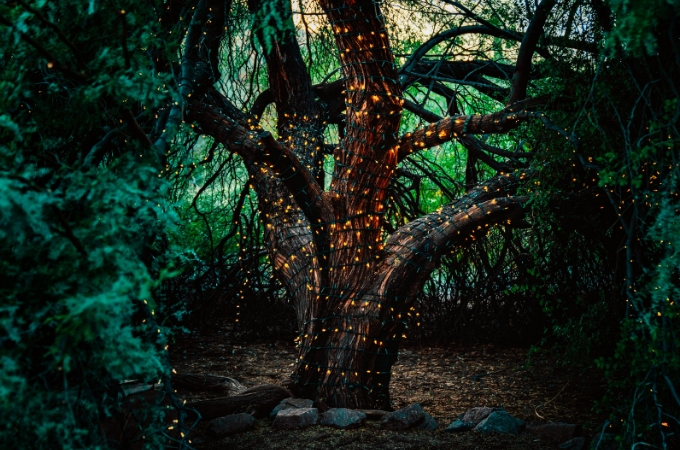
She carried it with her everywhere; the way one might carry a cold as an unwilling but obliging host. But unlike a cold, when an angry jinn inhabits your body, it changes the locks and wreaks havoc on your liver.
It was my cousin Corine who first saw my mother’s jinn. We were kids then, seven and nine, running barefoot around the giant acacia in the compound as the hot sand scorched our feet. I knew that kids running barefoot was a pet peeve of my mother’s, right up there with “chewing like a goat”. But playing with peers tends to breed amnesia by association. I was too lost in juvenile entertainment to look at my mother. If I had, I would have instantly spotted the rock jaw, the volcanic pupils, the pits in her neck from the lava bubbling in her throat. Instead, I heard Corine shriek. A thin, soul-splitting thing. She stood outside my tata Jama’s bedroom window, staring right through the glass, eyes petrified and unflinching. She pointed a quaky finger at the glass, at my mother behind her, as words tripped and tumbled out of her mouth.
“I see it!” she screeched when she could finally construct her sentences. I ran to see what she was talking about, a queasy lump in my stomach confirming what I already knew. But Corine spun away from the window to face my mother, sputtering, “It’s g-gone now b-but I saw it! Aisha, I swear I saw it!”
I believed her. Partly because Corine was the most composed cousin in the compound; it took a lot to get a reaction out of her, and oh did we try.
But mostly because I saw the look on my mother’s face. A smirk.
I was old enough to know that God does not smirk.
Smirking was the trademark of the devil.
*
It would be years later, after puberty and I had made a reluctant truce to be neither friend nor foe, that I would see my mother’s jinn myself.
We were in the kitchen making sombi, a sweet creamy porridge that doubled as a breakfast meal or daytime snack. A coconutty aroma filled the kitchen but the stifling afternoon air drifting in through the window had wrapped itself around my throat, making it hard to breathe. It seemed the breeze, usually up for a tussle with the heat, had gone on sabbatical. Even the giant acacia in the middle of the compound was stiffer than usual. Not a single sway or sign of life.
I sat on the cool tile, a calabash bowl gripped between my thighs as I picked black flecks from the rice. It was a tedious task and the combined heat from the saucepan and the sun was not helping. My mother sat on a low stool facing me, her soft hennaed curls tinted burgundy in the light. Her rosewood skin was slick with sweat, an oily sheen that I had regretfully inherited. I busied my mind with fantasies about the large ceiling fans in all the rooms, imagining how my sweat would praise me for switching one of them on and basking beneath it. I had once wondered aloud why there could not be an overhead fan in the kitchen, to which my mother had curtly pointed to the window and said, “Why would we need two fans in one room?” I almost pointed out the genius fact that all the rooms in the house had windows and fans, but some inner wisdom told me this was not an argument that was going to end in my favour. Not that any ever did. So, I made peace with my squelching armpits and quietly cursed the heat.
My mother lifted a glass from the counter behind her and gestured at the plastic water jug beside her. I had the jug hovering over her glass, its mouth already moistening with liquid, when the skin of my mother’s arm rippled, like wind tearing through desert sands. The jug slipped out of my hand and landed on its side, water cascading across the tiles. I heard the glass in my mother’s hand shatter.
“SubhanAllah!” my mother hissed.
But she was not looking at the shards of glass. A dread had settled over her face as she glared at her arms, rubbing and swatting at them like she was being stormed by an army of ants.
“A’oodhu Billahi min al-Shaytaan ir-rajeem!” she chanted, eyes shut tight as she extended her arms and appealed to Allah.
The water around my slippers vibrated, as if to call my attention. My mother’s frame from the waist up was reflected in the clear liquid, but what I saw in the water chilled my blood. A faceless, shadowy entity was trailing a smoky finger along the length of my mother’s arm. The thing was charred black, with an orange glow seeping through cracks on its surface. The ghost of an ice cube slid down my back, stiffening my spine. I stared transfixed as its gnarly finger trailed first one arm then the other while my mother continued to chant feverishly. Then a gritty chuckle, like shale and pebbles grinding against each other. I realized with horror that the jinn was amusing itself by tickling my mother. It seemed to sense my presence as it tilted its head towards me, and a glowing red coal of an eye latched onto me. Then my mother uttered one last emphatic plea and it was gone. Or at least, at bay. I started to walk towards her, but her arm jutted out to fill the space between us.
“Aisha, the floor,” she gestured at the shards of glass resembling ice fragments on the floor then rubbed her arms and shivered. We looked past each other, in honour of our silent treaty to witness but never air out the chinks in my mother’s steel shell.
*
My mother was the eldest of six girls, each about four years apart. Though they were very much their own individuals, they existed in the village imagination as a collective entity.
“There goes one of the Sukai Sisters…”
“Those Sisters sure know how to bulldoze men…”
“I heard another one of the Sukai Sisters got divorced again…”
“One of them say she has worms living in her skin and she believe it too! Heard she been to see every doctor under the sun…”
“Something’s not right in that family…”
So there my family lived, as scandal and thrill on village tongues. The Sukai Sisters; Salimata (my mother), Jama, Codou, Adama, Aida, and Ramata.
I wanted to chase down every one of our loose-lipped neighbours and make them choke on their words. Problem was, beyond feasting on information they were not privy to, they were not wrong. My mother did believe there were worms crawling under her skin, and she had sought out many specialists who were quick to speculate on the various psychiatric conditions she could be suffering from.
And there was something sinister underlying all their intimate relationships. My cousins and I had jokingly dubbed it the “Sukai Curse”, a dark cloud of divorce and death that followed our mothers into every relationship they dared venture into. We had all, at one time or another, sighted an entity inside all six of them, and we had seen enough to share a consensus that these entities had a firm hand in the failures of our mothers’ relationships.
These were the facts. Four of them had each experienced at least one divorce.
My mother’s marriage to my father lasted the first five years of my life. And much of what I remember involved them on opposite ends of the room. It was as though my father were an electric fence or a scorpion-infested bedsheet my mother could not get far enough from. The worms were just the clincher, a symptom of a sickness that plagued the women in my family. People told me you Sukai sisters were crazy, but I didn’t listen. I’m listening now! You will not make a fool of me in my own town! Many shamed my father for leaving me behind. Many saluted him for lasting as long as he did with my mother.
My tata Aida’s first marriage ended in divorce when she found him in bed with one of her helpers. Her first-born, who was nine or ten at the time, said tata Aida beat her husband and the helper so badly, they both ended up in the hospital. That was the first time my cousin Malick saw his mother’s jinn. Tata Aida’s second marriage ended even more violently. Her and tonton Biram fought constantly, and one night when they were driving home from a relative’s wedding in the city, they got into a car accident. According to tonton Biram’s version, my aunt rammed the car into a tree on purpose knowing only she had a seatbelt on. He said that when he first turned to tell her to slow down, she was already watching him, foaming at the mouth with a manic glint in her eyes.
Tata Ramata was the youngest and most elusive. She descended on us for select holidays and family events and then disappeared for months, sometimes years at a time. It was this unapologetic allegiance to her nomadic roots that had torpedoed her marriage, leaving two bitter children to ply their father with questions about their mystifying mother. But I had also seen tata Ramata’s jinn and it was male, which made me wonder if a clash in masculine energies had helped dissolve her marriage. Seeing her male jinn explained a lot of my aunt’s quirks, from her utilitarian gait (not an iota of grace or bounce in her hips despite inheriting my grandmother’s curves) to her boombox voice.
Then there was my tata Adama, who had turned divorce into an art form that could be mastered. At 36, she had been married four times, bearing four kids with four fathers. She was now courting a man who wanted to make her wife number two. I laughed and laughed when I first heard the news, knowing that tata Adama came second to nobody. If she was still courting the man, she was still interested, which meant wife number one was in big trouble.
For my two aunts that had not yet danced with divorce; tata Codou’s husband had died of a heart attack two years into their marriage, and she was now remarried to a man with a chronic illness; and tata Jama was in a marriage that would make divorce look like a fairy godmother.
My tata Jama had the longest lasting marriage of all my aunts, but love wasn’t the adhesive that had kept her 18-year marriage together. The way my mother explained it to me as a precocious child was that love was too buoyant to hold a marriage down the way that something as dense and fleshy as fear could. When tata Jama found out after having Corine that she couldn’t have more children, the physical abuse she had endured at the hands of her husband metastasized into emotional and psychological turmoil. No-one could save her from her own marriage; not my grandmother who sat her and tonton Babacar down before she passed and told them she had not birthed a child who was a punching bag; not a tear-strewn Corine who had called the police on her father more times than she had celebrated birthdays; and certainly not the responding policemen who just pursed their lips at the family and said, “We don’t intervene in private home matters.” But tata Jama didn’t seem to have an appetite for self-preservation. Even when the rumours started circling that tonton Babacar had a second family and had seeded many heirs to compete with Corine for his thriving sugarcane businesses. Meanwhile, Corine, at the peak of what should have been her teenage blossom years, retreated further into herself until there was nothing left for me to latch onto to preserve our bond. My attempts to reignite old, shared musings of the “Sukai Curse” fizzled like a candle in the wind.
Eventually, it hurt to even look into Corine’s eyes because all I saw were the anxious pupils of a child trapped in the terror of a loved one.
*
My cousins and I held secret meetings under the giant acacia to share updates and sightings. We would gather under the shade of the leaves for as long as we could get away with between chores, school, and homework, and try to fit together pieces of story fragments we each had about the “Sukai Curse.” All 13 of us, ranging in age from 10 to 21 signed a spit pact that whoever saw something was to whistle a warning for the rest to steer clear of that aunt. Often, an entity sighting meant violence was not far behind. We didn’t have the vocabulary for what we saw until one of my bookworm cousins brought home a book from the school library one day with an entire chapter on jinns.
Jinn.
The word alone sent a shudder rippling through me. It was familiar but I couldn’t place it until Malick, who was starting to memorize the Qur’an, recited several verses about the beings in the holy book.
Jinns were spirits. Forged from smokeless fire. Wielding fiery tempers. Not inherently good or evil. Like humans, choices determined their fate. Shapeshifters. Colonizers of human bodies. Neither angel, nor demon. But Satan himself was a jinn.
The word itself meant “hidden from sight.”
The one that eyes cannot see.
My head spun as I listened and learned. I needed answers, but all my cousins could offer were the same questions I had. We quickly discovered it was impossible to put a puzzle together without all the puzzle pieces.
But we kept trying; holding up fragments for each other and trying to fit them from different angles. And when a call came from any direction of the wind, we didn’t try to distinguish if it came from human or jinn.
We just scattered like dandelion seeds.
*
It was just after my 17h birthday when I finally mustered the courage to ask my mother if she knew what lived inside her. She looked at me like I was daft and said, “Aisha, it’s my body, of course I know what’s inside it.” I wanted to mumble back, if you know your body so well, then why do you seek out doctors for diagnoses? Then decided I had a lot of living left to do. She saw the question in my eyes and said, “There’s only so much that science can solve. But you don’t lock your doors and windows when your house is burning. You explore all your options.”
I sucked in air and, in a shrunken voice, said, “It’s not worms, Mama.” My body instantly folded into itself. I had first-hand experience of what my mother’s rage could do. In a household where beatings were dished out like entrées, and a tongue was more corrosive than battery acid, my body was permanently in fight or flight mode.
But nothing happened. No icy echo of her knuckles against my scalp reverberating inside my skull for days. No piercing white heat of an outer ear flap being twisted beyond its flexibility. No spittle spraying from poisonous lips, blighting every inch of skin landed on. No apocalyptic descent of an open palm with a voracious appetite for cheeks. Nothing but the cold dread of expectation. Eventually, I forced my eyes open and was surprised to find my mother standing at the far end of the living room, a melancholic expression on her face as she looked at me.
“You’re afraid of me. Your own mother. Like I could ever hurt you.”
But that’s all you do.
I said nothing. Which to her said everything.
“I know it’s not worms,” she said after a while. Not what I expected to hear. “But it’s easier telling people you have worms inside you than telling them the devil is playing house inside you.”
“How did the devil get there, Mama?” Or has it always been there? The words came like vomit spilling out over the barricade of my lips. My mother was not a person you asked questions to. She was the sole wielder of authority over questions. What are you doing? Why are you doing that? What did I tell you about focusing on your books? Who gave you permission? Why are you being idle? What do you need the money for? What happened to the money I gave you? Who are you going with? What do you want to do with your life? What is your life plan? And on, and on. Only by her grace did a question leave her grip to flutter into the mouth of another. But again, she surprised me.
“It began with your grandfather.”
*
My grandfather was a proud man, my mother said. He was of a people in whose nature it was to roam freely, wandering with the wind, forever in search of greener pasture for his herds. He neither desired nor could claim the infinite landscapes he passed through each year with his cattle. But when he met a beautiful young woman in one of the settlements he came across, he found himself reimagining a life with roots.
He married my ouma within days, to the great chagrin of my ouma’s father, who had imagined for his daughter a stable and honourable life with kin on land she had inherited from her ancestors. Instead, his daughter had taken up with a herder. The farmer was patient, certain that eventually the spirit of the herder’s ancestors would drive him away. But the herder remained; it seemed a farmer’s daughter had tamed a wild man.
My grandfather’s cattle, on the other hand, weren’t so easily subdued. They claimed the lush farmland as their own, trampling on seedlings and feasting on fields of crop, rousing in the farmer a hatred and fury he had never known. My grandfather sensed his father-in-law’s frustration grow as his fields turned into grazing land and his daughter’s allegiance flipped overnight from the land to her new lover. When my grandfather’s herd began to dwindle, tensions escalated. My ouma threatened to run off with my grandfather, forcing the farmer to end his rampage. When my grandparents had my mother, that was the final straw. The farmer finally realized my grandfather was not going anywhere and so he went into the mountains to seek out the medicine woman who lived among the rocks.
The medicine woman gave the farmer a small pouch that he returned home with, and when he thought no one was looking, dug a hole in a corner of the compound, and planted something other than crop for the first time on his land. My grandfather watched from a window. He told no one because he was uncertain what he saw himself. Not wanting to stir up any more trouble with his father-in-law, my grandfather decided to wait until dark, after sleep had seduced the household, to go out and see for himself what the farmer had planted. The crop fields were beyond a makeshift fence at the back of the compound so whatever the farmer had planted couldn’t be crop.
Thunder rumbled just before dusk, and by the time they all sat down to dinner, the heavens had broken open. Wind whipped at the windows, as my mother’s lungs belted along with the heavy rain railing against the roof. It rained until dawn and when my grandfather finally made it across the soaked soil to the area where the farmer had knelt just the day before, he dug and dug to no avail. He was certain he was digging in the right place. He cursed the rain. The downpour had either lodged whatever had been planted deeper into the soil, or the flood waters had swept the item away, to be reburied in some other part of the compound. But the compound was massive, and the carpet of sand was endless.
My grandfather returned to the house he had built for my ouma on her father’s land. Scraping at the dirt beneath his fingernails, he told my ouma that he had seen the farmer bury something in the compound the day before and it all felt wrong. The farmer was eccentric, my ouma said. And extremely protective of things he owned. But he trusted the earth and was likely just leaving some heirloom in the earth’s care. No, my grandfather said. Where I come from, he told my ouma, people only bury three things; seed, the dead, or hoodoo, and the farmer was not carrying the first two. No, my ouma said, my father is an honourable man, we do not do such things here. Let us ask him, my grandfather said, for the sake of our family.
And so, they went down to the chicken coop where the farmer was, and my ouma didn’t mince words. Daddy, did you bury something in the compound yesterday? My grandfather fully expected a denial but though the farmer was surprised, he nodded and said, I did. Was it an heirloom, daddy? It was an heirloom, wasn’t it? The farmer looked at my grandfather then, a smile twisting on his lips in the manner of one who had tasted victory, and said, Something like that, Maira.
My mother paused at this point in the story.
“What then, Mama?”
“Aisha, I’m telling you this because it is your birthright. But be wary of stories. They tend to enter your ears and settle in your cells, where they can do all sorts of damage.”
“Okay, Mama, but did grandpa ever find out what the farmer buried?”
“Your grandfather said he didn’t sleep that night and for many nights afterwards because while he lay dissecting an argument he’d had with your ouma that day– “
“What was the argument about?”
“Your grandfather wanted to leave the farmer’s property behind and go off and make their own home elsewhere. But your ouma said he was being ridiculous and paranoid, and she wasn’t leaving behind the only home she’d ever known, especially not with a new baby. She told him they could discuss it in the future when I was older, but then they had your tata Jama and then Codou and it seemed with each new addition to the family, their roots in your great-grandfather’s soil grew deeper. Eventually, the idea of leaving the land was too abstract, especially after your great-grandfather passed away and your ouma inherited the land.”
“So, what was buried?”
“Well, your grandfather said that as your ouma and I slept that night, a spirit came into the room. It leaned in close to your sleeping ouma and told her she had brought shame to her kin by marrying a herder. The spirit then spoke of the farmer’s visit to the medicine woman in the mountains. That because your ouma had dishonoured her people, her own kin would dishonour her. The spirit then turned to your grandfather and said–” My mother’s head sank, as if it had grown too heavy under the weight of the story.
“What, Mama?”
When she finally lifted her head and spoke again, pain was etched in her eyes. “The spirit told your grandfather that the curse had taken root and no future generation descending from your grandfather and your ouma would ever find happiness or success in matrimony.” My mother wore this statement like a battle scar. “So, you see, Aisha, our family is cursed. And if the story is true, then it means you will meet our fate, and I don’t want that for you.”
“Do you believe the story, Mama?”
“It’s hard to argue with our track record. There is something undeniable inside us, all of us, that won’t let us connect with men. It fills me with great shame to say this, but I used to be repulsed by your father. I loved him enough to marry him and it still makes no sense to me because your father always took great pride in his hygiene and appearance. But my skin would crawl when he touched me, like the chemical reaction of our skin coming together produced maggots. It’s a wonder how you were conceived. And the rage, Aisha. Oh, the rage. Just seeing him breathing was enough to make me explode. It’s the truth. I know this is hard for you to hear but you must know. You have to understand so that one day when you meet someone you love who also makes your skin crawl, you understand how those two things can coexist.”
She stood at the window overlooking the compound. She looked at something for a long time and then said, “It’s beneath the tree, I just know it.” I walked over to where she was standing and looked out the window. The giant acacia stood stiff as ever, its thick trunk and sprawling mane glowing orange in the fading afternoon light. I thought it strange how no birds ever seemed to circle or roost on its branches. “Something has never been right with that tree. It doesn’t behave like other trees and the branches whisper foul things, things that no true arm of nature would dare whisper. I’m almost certain that whatever your great-grandfather buried in this compound ended up right where that tree sprouted. Something in me feels pulled towards it, like it’s home.”
“I feel it too. Especially when we’re sitting right under it.”
“I was afraid you’d say that. If you feel the pull it means it’s getting stronger inside you. They live inside that tree. A whole family of them attached to our family. The tree grows a branch whenever there’s a birth in the family so there hasn’t been a new branch for a long time.”
I felt a hole spreading like quicksand in my stomach. I knew it was only a matter of time until the infection spread to our generation where it would sprout legs and leave a legacy for itself.
“We each have our own branch?” I stared at the tree, wondering which of its snaky limbs had my name etched into it. It was a while before I realized she hadn’t responded.
“Soon you’ll be going off to university, Aisha, and I don’t want this filling up your mind and distracting you from your studies. It’s better that you go, really. Maybe you won’t feel its pull as strongly with the distance.”
“But what about you, in this house alone, with that tree there taunting you all the time? If all this traces back to something our ancestor buried in the compound and you believe that tree grew out of whatever he buried, then shouldn’t it all end if we cut down the tree?”
“You think I haven’t thought of that? Everything inside me screams that it’s a bad idea.”
“But don’t you see that’s probably it telling you it’s a bad idea so you don’t cut down the tree? If they’re anchored to us through that tree, obviously they wouldn’t want you cutting it down!”
Finally, she agreed it was worth a try.
Two lumberjacks came in the morning, each armed with a hefty axe. I led them to the towering acacia, then stood back to give them space for the wide swings they would no doubt need.
The men didn’t budge, and their axes continued to point downwards for several long seconds. They scanned the compound, looked at each other, then looked at me with cocked eyebrows.
“What are you doing?” I asked.
“Where is it? Thought you said you wanted a tree cut down?”
“That would be the tree right behind you.”
The men scratched their heads. “Miss, excuse me, but there are no trees in this compound.”
“You’re standing right in front of it! Two steps forward and you’ll bump right into it!”
The men took several steps forward and stood right in the centre of the tree as I stared at them, aghast. They shot me an unamused glare and stormed back the way they came, offering expletives on their way out the compound gate.
From the back of my throat came a grainy chuckle, like shale and pebbles grinding against each other.
Photo by Meritt Thomas on Unsplash



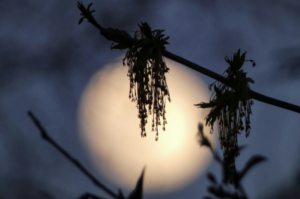
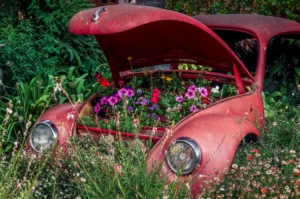
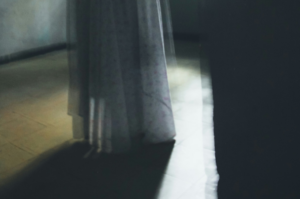

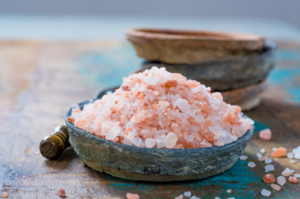


Ama June 24, 2022 09:24
Beautiful piece. I really love this work of fiction